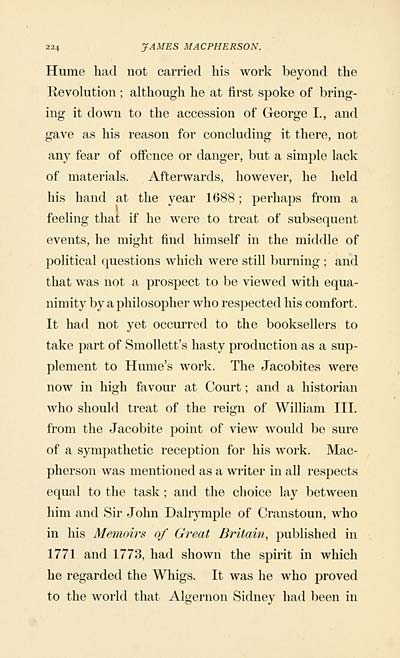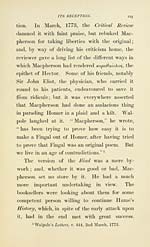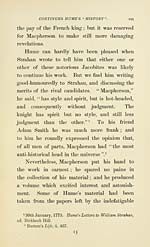Download files
Complete book:
Individual page:
Thumbnail gallery: Grid view | List view

224 JAMES MACPHERSON.
Hume had not carried his work beyond the
Revolution ; although he at first spoke of bring-
ing it down to the accession of George I., and
gave as his reason for concluding it there, not
any fear of offence or danger, but a simple lack
of materials. Afterwards, however, he held
his hand at the year 1688 ; perhaps from a
feeling that if he were to treat of subsequent
events, he might find himself in the middle of
political questions which were still burning ; and
that was not a prospect to be viewed with equa-
nimity by a philosopher who respected his comfort.
It had not yet occurred to the booksellers to
take part of Smollett's hasty production as a sup-
plement to Hume's work. The Jacobites were
now in high favour at Court ; and a historian
who should treat of the reign of William III.
from the Jacobite point of view would be sure
of a sympathetic reception for his work. Mac-
pherson was mentioned as a writer in all respects
equal to the task ; and the choice lay between
him and Sir John Dalrymple of Cranstoun, who
in his Memoirs of Great Britain, published in
1771 and 1773, had shown the spirit in which
he regarded the Whigs. It was he who proved
to the world that Algernon Sidney had been in
Hume had not carried his work beyond the
Revolution ; although he at first spoke of bring-
ing it down to the accession of George I., and
gave as his reason for concluding it there, not
any fear of offence or danger, but a simple lack
of materials. Afterwards, however, he held
his hand at the year 1688 ; perhaps from a
feeling that if he were to treat of subsequent
events, he might find himself in the middle of
political questions which were still burning ; and
that was not a prospect to be viewed with equa-
nimity by a philosopher who respected his comfort.
It had not yet occurred to the booksellers to
take part of Smollett's hasty production as a sup-
plement to Hume's work. The Jacobites were
now in high favour at Court ; and a historian
who should treat of the reign of William III.
from the Jacobite point of view would be sure
of a sympathetic reception for his work. Mac-
pherson was mentioned as a writer in all respects
equal to the task ; and the choice lay between
him and Sir John Dalrymple of Cranstoun, who
in his Memoirs of Great Britain, published in
1771 and 1773, had shown the spirit in which
he regarded the Whigs. It was he who proved
to the world that Algernon Sidney had been in
Set display mode to: Large image | Transcription
Images and transcriptions on this page, including medium image downloads, may be used under the Creative Commons Attribution 4.0 International Licence unless otherwise stated. ![]()
| Early Gaelic Book Collections > Ossian Collection > Life and letters of James Macpherson > (242) |
|---|
| Permanent URL | https://digital.nls.uk/80361639 |
|---|
| Description | Selected books from the Ossian Collection of 327 volumes, originally assembled by J. Norman Methven of Perth. Different editions and translations of James MacPherson's epic poem 'Ossian', some with a map of the 'Kingdom of Connor'. Also secondary material relating to Ossianic poetry and the Ossian controversy. |
|---|
| Description | Selected items from five 'Special and Named Printed Collections'. Includes books in Gaelic and other Celtic languages, works about the Gaels, their languages, literature, culture and history. |
|---|

